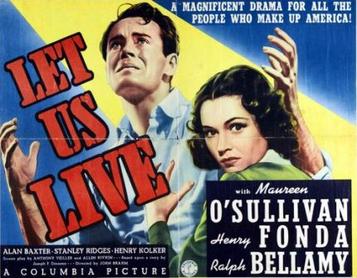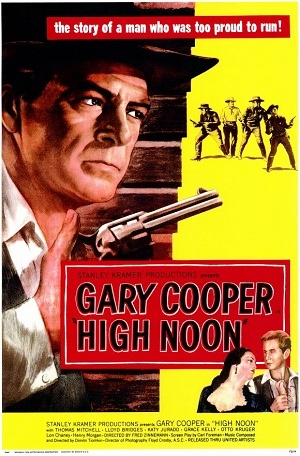In the 1939 film, Let Us Live!, Henry Fonda plays Brick Tennant. Brick is a poor but honest taxi driver who has always lived a law-abiding life and who is looking forward to marrying waitress named Mary Roberts (Maureen O’Sullivan). However, when a taxi is used as a getaway car in a violent robbery that leaves a policeman dead, Brick finds that he’s a suspect.
At first, Brick isn’t too worried. It turns out that every taxi driver in Boston is apparently being considered a suspect. Brick is just 1 out of 120. However, when the police bring Brick in to take part in a lineup, one of the witnesses insists that Brick and his friend, Joe Linden (Alan Baxter), were involved in the robbery. Despite the fact that Brick and Mary were at a church, planning their wedding, during the robbery, Brick and Joe are arrested and put on trial for murder. Despite Brick’s initial faith in the system, he and Joe are convicted and sentenced to die.
On death row, Brick faces the inhumane reality of American justice. He watches as other prisoners slowly lose their mind as a result of neglect and abuse. He watches as another prisoner drops dead in front of him, to the indifference of the guards. Even when Mary tells him that she’s still looking for evidence that will exonerate him, Brick says that he no longer cares. The state of Massachusetts is determined to kill him and he doesn’t believe that there’s any way stop them. As Mary puts it, Brick is now dead inside.
Still, Mary continued to investigate. Helping her is a police detective named Everett (Ralph Bellamy). Everett comes to realize that two innocent men are sitting on Death Row but will he and Mary be able to find the real culprits before the state executes Brick and Joe?
While watching Let Us Live, I found it impossible not to compare the film to The Wrong Man, another film in which Henry Fonda played an innocent man being railroaded by the system. Both The Wrong Man and Let Us Live were based on a true stories, though Let Us Live takes considerably more liberty with its source material than The Wong Man does. Whereas The Wrong Man is a docudrama that’s full of moody atmosphere courtesy of director Alfred Hitchcock, Let Us Live is much more of a fast-paced, melodramatic B-move.
That said, Let Us Live! is still a definitely effective look at how an innocent man can be railroaded by a system that’s often more concerned with getting a quick conviction than actually searching for the truth. Sadly, the issues that Let Us Live deals with are just as relevant today as they were in 1939. The film’s power comes from Henry Fonda’s performance as Brick. It’s truly heart-breaking to watch Brick go from being a cheerful optimist to a man who has been so broken down by American justice that he can’t even bring himself to celebrate the news that he might be released. The film ends on a grim note, a reminder that some damage cannot be undone.
Let Us Live! is another good but obscure film that I discovered through TCM. Keep an eye out for it!


